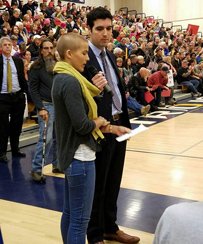Victoria’s Story
- Cancer Type: Hodgkins Disease
- Age at Diagnosis: 25


What is your current treatment state?
Currently undergoing treatment
Did you undergo any fertility preservation treatments?
No, I considered it
Did someone on your healthcare team speak to you about the possible effects of cancer treatments on your fertility?
Yes
Who raised the topic?
I did
Was the information you received thorough and helpful?
No
When were you told that your fertility might be affected by your cancer treatments?
Before I started active treatment
Why did you not undergo fertility preservation?
It was too expensive.
Victoria’s Story
My 28 year old sister received her cancer diagnosis six months before I received mine. I was just 25. For anyone who has been dealt the crushing blow of being told you have cancer as I have, or has helped care for a loved one during their battle with the illness as I did for my sister, I do not need to emphasize the resilience it requires to remain hopeful, to keep your eyes on the future. Adding to this difficulty is the crossroads for those of us diagnosed during our reproductive years. The instant we are told we have a life-threatening illness, we have to begin discussions of the future of our fertility. I watched my sister come to terms with the fact that she would never have another child, and I eventually made the decision to risk my ability to have my first. When I was diagnosed with Hodgkin’s, I was given less than a week to discuss my options with my husband, a newly arrived immigrant from West Africa, whose culture marks marriage with the ability to expand the family tree. We met with a fertility specialist through Kaiser, who essentially told us that we would need to begin the process immediately, as it would delay my chemotherapy treatments. The catch was that I would need to come up with $15,000 in cash by the next business day. We were not provided any information about insurance coverage for the medically necessary procedures I should have received prior to starting a chemotherapy regimen that would pose a threat to my ability to start a family. When I called my insurance provider about my coverage options, I was met with confusion and told that fertility preservation is not part of my health care plan. The process was disorganized and left me feeling that I did not have a choice. To be frank, I have felt ashamed of myself since that day. As a future social worker, I feel that I should have been a better advocate for myself and my husband. I now have to watch as chemotherapy drugs are pumped into my body, knowing that they are killing my cancer, but could be destroying my chances of having a child. I can say with all sincerity that it keeps me up at night.